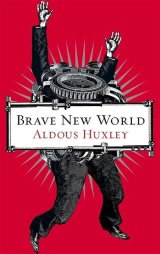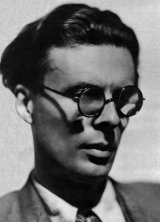Brave New World Page #2
Odd, original and irreverent, Aldous Huxley's tour de force is a darkly satiric vision of a "utopian" future --where humans are genetically bred and pharmaceutically anesthetized to passively serve a ruling order. A powerful and thought-provoking classic of speculative fiction, Brave New World is entertaining, fascinating, and terrifying all at the same time and remains remarkably relevant to this day as a warning to be heeded as we head into tomorrow.
Major instruments of social stability. Standard men and women; in uniform batches. The whole of a small factory staffed with the products of a single bokanovskified egg. "Ninety-six identical twins working ninety-six identical machines!" The voice was almost tremulous with enthusiasm. "You really know where you are. For the first time in history." He quoted the planetary motto. "Community, Identity, Stability." Grand words. "If we could bokanovskify indefinitely the whole problem would be solved." Solved by standard Gammas, unvarying Deltas, uniform Epsilons. Millions of identical twins. The principle of mass production at last applied to biology. "But, alas," the Director shook his head, "we can't bokanovskify indefinitely." Ninety-six seemed to be the limit; seventy-two a good average. From the same ovary and with gametes of the same male to manufacture as many batches of identical twins as possible–that was the best (sadly a second best) that they could do. And even that was difficult. "For in nature it takes thirty years for two hundred eggs to reach maturity. But our business is to stabilize the population at this moment, here and now. Dribbling out twins over a quarter of a century–what would be the use of that?" Obviously, no use at all. But Podsnap's Technique had immensely accelerated the process of ripening. They could make sure of at least a hundred and fifty mature eggs within two years. Fertilize and bokanovskify–in other words, multiply by seventy-two–and you get an average of nearly eleven thousand brothers and sisters in a hundred and fifty batches of identical twins, all within two years of the same age. "And in exceptional cases we can make one ovary yield us over fifteen thousand adult individuals." Beckoning to a fair-haired, ruddy young man who happened to be passing at the moment. "Mr. Foster," he called. The ruddy young man approached. "Can you tell us the record for a single ovary, Mr. Foster?" "Sixteen thousand and twelve in this Centre," Mr. Foster replied without hesitation. He spoke very quickly, had a vivacious blue eye, and took an evident pleasure in quoting figures. "Sixteen thousand and twelve; in one hundred and eighty-nine batches of identicals. But of course they've done much better," he rattled on, "in some of the tropical Centres. Singapore has often produced over sixteen thousand five hundred; and Mombasa has actually touched the seventeen thousand mark. But then they have unfair advantages. You should see the way a negro ovary responds to pituitary! It's quite astonishing, when you're used to working with European material. Still," he added, with a laugh (but the light of combat was in his eyes and the lift of his chin was challenging), "still, we mean to beat them if we can. I'm working on a wonderful Delta-Minus ovary at this moment. Only just eighteen months old. Over twelve thousand seven hundred children already, either decanted or in embryo. And still going strong. We'll beat them yet." "That's the spirit I like!" cried the Director, and clapped Mr. Foster on the shoulder. "Come along with us, and give these boys the benefit of your expert knowledge." Mr. Foster smiled modestly. "With pleasure." They went. In the Bottling Room all was harmonious bustle and ordered activity. Flaps of fresh sow's peritoneum ready cut to the proper size came shooting up in little lifts from the Organ Store in the sub-basement. Whizz and then, click! the lift-hatches hew open; the bottle-liner had only to reach out a hand, take the flap, insert, smooth-down, and before the lined bottle had had time to travel out of reach along the endless band, whizz, click! another flap of peritoneum had shot up from the depths, ready to be slipped into yet another bottle, the next of that slow interminable procession on the band. Next to the Liners stood the Matriculators. The procession advanced; one by one the eggs were transferred from their test-tubes to the larger containers; deftly the peritoneal lining was slit, the morula dropped into place, the saline solution poured in … and already the bottle had passed, and it was the turn of the labellers. Heredity, date of fertilization, membership of Bokanovsky Group–details were transferred from test-tube to bottle. No longer anonymous, but named, identified, the procession marched slowly on; on through an opening in the wall, slowly on into the Social Predestination Room. "Eighty-eight cubic metres of card-index," said Mr. Foster with relish, as they entered. "Containing all the relevant information," added the Director. "Brought up to date every morning." "And co-ordinated every afternoon." "On the basis of which they make their calculations." "So many individuals, of such and such quality," said Mr. Foster. "Distributed in such and such quantities." "The optimum Decanting Rate at any given moment." "Unforeseen wastages promptly made good." "Promptly," repeated Mr. Foster. "If you knew the amount of overtime I had to put in after the last Japanese earthquake!" He laughed goodhumouredly and shook his head. "The Predestinators send in their figures to the Fertilizers." "Who give them the embryos they ask for." "And the bottles come in here to be predestined in detail." "After which they are sent down to the Embryo Store." "Where we now proceed ourselves." And opening a door Mr. Foster led the way down a staircase into the basement. The temperature was still tropical. They descended into a thickening twilight. Two doors and a passage with a double turn insured the cellar against any possible infiltration of the day. "Embryos are like photograph film," said Mr. Foster waggishly, as he pushed open the second door. "They can only stand red light." And in effect the sultry darkness into which the students now followed him was visible and crimson, like the darkness of closed eyes on a summer's afternoon. The bulging flanks of row on receding row and tier above tier of bottles glinted with innumerable rubies, and among the rubies moved the dim red spectres of men and women with purple eyes and all the symptoms of lupus. The hum and rattle of machinery faintly stirred the air. "Give them a few figures, Mr. Foster," said the Director, who was tired of talking. Mr. Foster was only too happy to give them a few figures. Two hundred and twenty metres long, two hundred wide, ten high. He pointed upwards. Like chickens drinking, the students lifted their eyes towards the distant ceiling. Three tiers of racks: ground floor level, first gallery, second gallery. The spidery steel-work of gallery above gallery faded away in all directions into the dark. Near them three red ghosts were busily unloading demijohns from a moving staircase. The escalator from the Social Predestination Room. Each bottle could be placed on one of fifteen racks, each rack, though you couldn't see it, was a conveyor traveling at the rate of thirty-three and a third centimetres an hour. Two hundred and sixty-seven days at eight metres a day. Two thousand one hundred and thirty-six metres in all. One circuit of the cellar at ground level, one on the first gallery, half on the second, and on the two hundred and sixty-seventh morning, daylight in the Decanting Room. Independent existence–so called.
Translation
Translate and read this book in other languages:
Select another language:
- - Select -
- 简体中文 (Chinese - Simplified)
- 繁體中文 (Chinese - Traditional)
- Español (Spanish)
- Esperanto (Esperanto)
- 日本語 (Japanese)
- Português (Portuguese)
- Deutsch (German)
- العربية (Arabic)
- Français (French)
- Русский (Russian)
- ಕನ್ನಡ (Kannada)
- 한국어 (Korean)
- עברית (Hebrew)
- Gaeilge (Irish)
- Українська (Ukrainian)
- اردو (Urdu)
- Magyar (Hungarian)
- मानक हिन्दी (Hindi)
- Indonesia (Indonesian)
- Italiano (Italian)
- தமிழ் (Tamil)
- Türkçe (Turkish)
- తెలుగు (Telugu)
- ภาษาไทย (Thai)
- Tiếng Việt (Vietnamese)
- Čeština (Czech)
- Polski (Polish)
- Bahasa Indonesia (Indonesian)
- Românește (Romanian)
- Nederlands (Dutch)
- Ελληνικά (Greek)
- Latinum (Latin)
- Svenska (Swedish)
- Dansk (Danish)
- Suomi (Finnish)
- فارسی (Persian)
- ייִדיש (Yiddish)
- հայերեն (Armenian)
- Norsk (Norwegian)
- English (English)
Citation
Use the citation below to add this book to your bibliography:
Style:MLAChicagoAPA
"Brave New World Books." Literature.com. STANDS4 LLC, 2025. Web. 22 Feb. 2025. <https://www.literature.com/book/brave_new_world_2066>.








Discuss this Brave New World book with the community:
Report Comment
We're doing our best to make sure our content is useful, accurate and safe.
If by any chance you spot an inappropriate comment while navigating through our website please use this form to let us know, and we'll take care of it shortly.
Attachment
You need to be logged in to favorite.
Log In